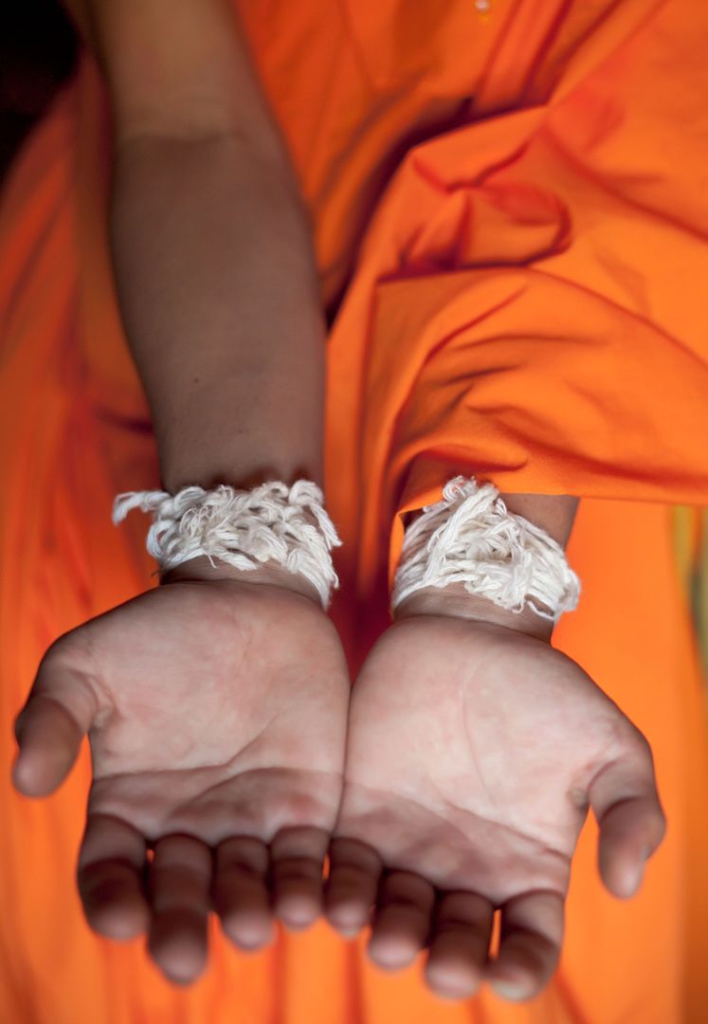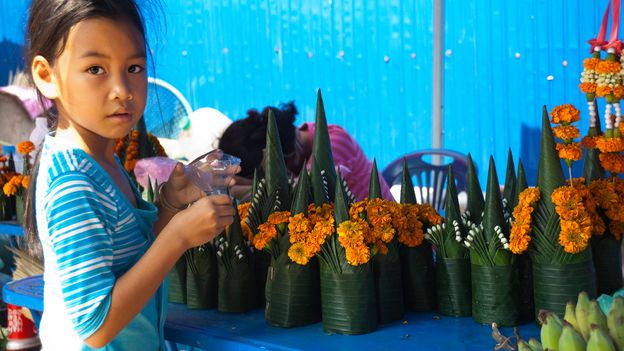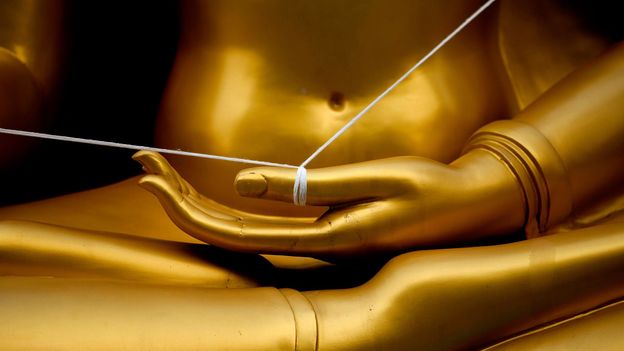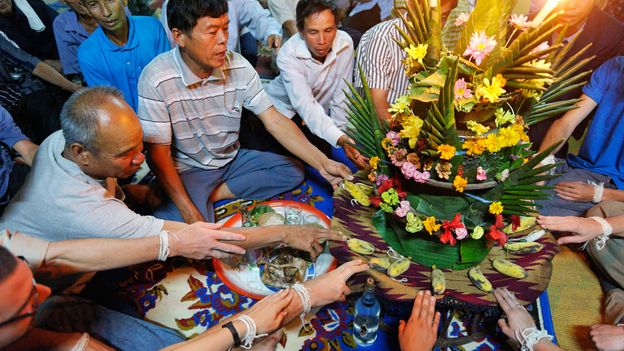In the Western world, you would mark a student receiving a diploma, a couple announcing their engagement, a family moving to a new home or a relative falling ill in very different ways.
Some of these events might involve your entire family or community, but likely not all of them.
It’s a different story in Laos where each of these moments in a person’s life – particularly when it comes to illness – calls for the presence of as many friends and relatives as possible, who gather at a “soul-calling” ceremony to express their care and even help one another heal.
The ritual, called a baci or su khuan, incorporates practices from Theravada Buddhism, Brahmanism and animism, and is based on the belief that there are several souls or khuan (vital essences) in the body, which must all be kept inside for someone to be well.
The number of souls varies depending on which of Laos’ many ethnic groups the person is part of, but the majority group – the Lao – believe there are 32.
If you have any kind of traumatic life event, such as being frightened or getting sick, it’s thought your souls can escape from your body, which can result in physical symptoms such as feeling tired or losing your appetite.
Essentially, the baci ceremony is the Lao way of re-establishing balance within the body, but the ritual can also be used as a preventative measure against illness – or to ensure good fortune, for example, if someone was going off to university or about to get married.

Sengdeuane "Ning" Inthilad has taken part in many of these ceremonies in his lifetime. “If you’re going to travel somewhere for a long time, you have a ceremony; if you have a new house, there’s also a ceremony; if you get sick or have an operation, they also do the ceremony for you,” he said.
“If you’re sick or have just come back from an operation or have had an accident, the ceremony is about calling the spirits back to your body to protect you.”
The ceremony usually takes place inside the home of the person who is ill or undergoing a major life event and is presided over by a village elder.
In the middle of the room, family members place a flower montage made of banana leaves and French marigolds to which white cotton strings are attached.
Once the ceremony starts, the elder calls back the souls that have departed by chanting sacred words, and wishes the person good health and good luck.
Then, the rest of the participants take turns wishing the person well while tying the cotton strings around his or her wrists to keep their newly returned souls inside the body.
These strings also represent the connection between the person who’s having the life event and the person who gave them well wishes, and they must be worn for three days to seal the bond.
Elizabeth Elliott, a medical anthropologist studying healing traditions in the southern lowlands of Laos at University College London, says that the baci ceremony is perhaps the most tangible representation of wellness and wellbeing in Laos, which has a broader meaning than just being healthy in a purely physical sense.
Here, emotional, spiritual and social wellbeing are also necessary for a Lao person to be well.
“It’s something that’s really bound up with a person’s whole state – with their emotional balance, their relationships with their family and other people, and with the spirit world,” she said.
“What’s really pertinent about the baci ceremony is that people are literally bound together.”
The ceremony is also said to bring about kamlang jai (a powerful heart), which refers to the warm feelings you get from being together and experiencing care from others, especially if you’re unwell.
“Having that warm sense is something people describe as really important from an emotional as well as a practical point of view,” Elliott explained.

And while being surrounded by family and friends is considered essential to wellbeing, Lao people consider the state of poudiao (being alone) to be the most vulnerable.
This belief, according to Elliott, comes from past fears rooted in both real physical dangers and traditional spiritual beliefs.
“In the past, there were a lot of wild animals in the forest; there were genuinely a lot of dangers,” she said.
“But people also have still quite prevalent beliefs – particularly in rural areas – in the existence of the spirit world.
It’s connected with the idea of being attacked by dangerous spirits, or even sorcery, if you don’t have methods of protecting yourself.”
Laos-based ethnomusicologist Marie-Pierre Lissoir, who is curating an exhibition on the interaction between humans and spirits at the Traditional Arts & Ethnology Centre (TAEC) in Luang Prabang, says that her colleagues often ask her if she’s afraid to sleep alone in her house.
“Being alone somewhere is very scary because, ‘what about the spirits that are around?’,” she said. “They ask me ‘aren’t you afraid that they will come and catch you?’”
For the Lao people, living alone also goes against the local custom of community, where everyone has a role and family and neighbours are there to help if you have a problem.
“Even if you decide to live a little bit outside of the village, it’s seen as a little bit strange that you want to isolate yourself,” Lissoir said.
In more remote locations, community is considered even more important. Giulio Ongaro, an anthropologist based at the London School of Economics, focused his PhD on the medical system of the Akha people, who live in the north-western highlands of Laos.
“The Akha have a kinship-based society without any state or political structure,” he said.
“Having a kinship network around is of the utmost importance to wellbeing because many of their ceremonies require the presence of particular relatives.”

As well as a soul-calling ceremony, the Akha have a range of sacrificial rituals.
They believe serious illness can occur when a particular spirit afflicts someone, so during one of their more complex rituals, a shaman enters a trance and ventures into the spirit world to retrieve the person’s soul from that spirit.
When she returns (the Akha’s shamans are all women), animals are sacrificed to the spirit inside the house of the person who is sick in exchange for their soul.
“These rituals are very dramatic and expensive. They start in the evening and might finish in the afternoon the day after without sleeping,” said Ongaro.
“In order for the ritual to take place, all family members need to be present.
For example, if the daughter falls sick, the son who is studying elsewhere would have to come and stay in the house while the ritual takes place. An affliction to an individual is an affliction to the household.”
For Ongaro, the key reason for the ceremony’s continued popularity is that rituals tackle an aspect of wellbeing that is not touched by modern medicine.
“[The Akha people] believe modern medicine can be effective against organic illnesses of the body but can do very little or nothing about spiritual illness or illness of the soul,” he said.

It’s common for people in most Laos communities today to use a mix of modern and traditional healthcare approaches.
As Lissoir explained, “If someone is sick, they might do the ceremony first and then go to the hospital.
Then to be really sure, sometimes they’d do the ceremony again.” That’s because the ceremony has a specific practical purpose: to extend the responsibility of healing to the whole family and community.
“By involving the family or others in close social connection, and by focusing on this idea of the wandering souls,” said Elliott, “it’s a way to help the person feel better without putting a lot of pressure on them as an individual to deal with their own psychological problems.”
It’s also just not very pleasant to handle everything – or in Lao people’s case anything – on your own.
Popular jokes and sayings here revolve around the fact that spending time alone is not fun; food is considered more delicious when eaten together, and Lao people prefer not to sleep alone.
“Lao people are very fun-loving, very warm people,” said Elliott. “And it’s such a strong social norm – the idea of not being alone and being stronger with others.”
Inthilad is the only member of his family who has travelled alone to other countries. “Some of my family members thought I was crazy,” he said. “They said if you travel alone, you’re going to feel lonely; you won’t have any one to talk to.”
Things changed in Laos a bit during coronavirus lockdown, as people may have had contact with their immediate family members but less social contact beyond that.
Large New Year celebrations were cancelled, and there were reports of whole villages barring the entry of outsiders and repurposing traditional protective measures like “taleo”, a small bamboo talisman used to signal that a special event like a ceremony is taking place.
People also employed self-quarantine practices such as sleeping in rice field huts.
However, some smaller celebrations did take place. “We did the New Year ceremony but just for family members because we knew we were safe,” Inthilad said.
“Being with your family members is part of being healthy. If you don’t have family members around to make you happy, it sometimes links to your physical health and you feel weak.”
He added: “I believe if you think positive and do positive things for others, many good things are going to come to you even though you did not expect it.
Latest Stories
-
We have needed political will to fight galamsey – Defence Minister
55 minutes -
Meet the incoming Grand Master of the Grand Lodge of Ghana
57 minutes -
GAF has been empowered to fight galamsey menace – Defence Minister
1 hour -
Galamsey fight: We’ll talk less and let action and outcomes guide us – Defence Minister Omane Boamah
1 hour -
Dispatch rider granted GH¢16,000 bail in fraud case
1 hour -
Driver remanded over alleged escape from police custody
2 hours -
Security guard remanded for knife threat in iPhone robbery
2 hours -
Nigerians fear savings lost as investment app freezes them out
2 hours -
Brazilian butt lift ads banned by UK regulator
2 hours -
Nvidia expects $5.5bn hit as US tightens chip export rules to China
2 hours -
Strong macroeconomy key to sustaining Ghana’s capital market – Stanbic executive
3 hours -
Revolutionising pension funds in Ghana through securities lending
3 hours -
Driving Ghana’s economic growth through public sector financing
3 hours -
Ewe family series House of Klu launches on Akwaaba Magic
3 hours -
Heavy drinking linked with lasting impact on the brain, study finds
3 hours

